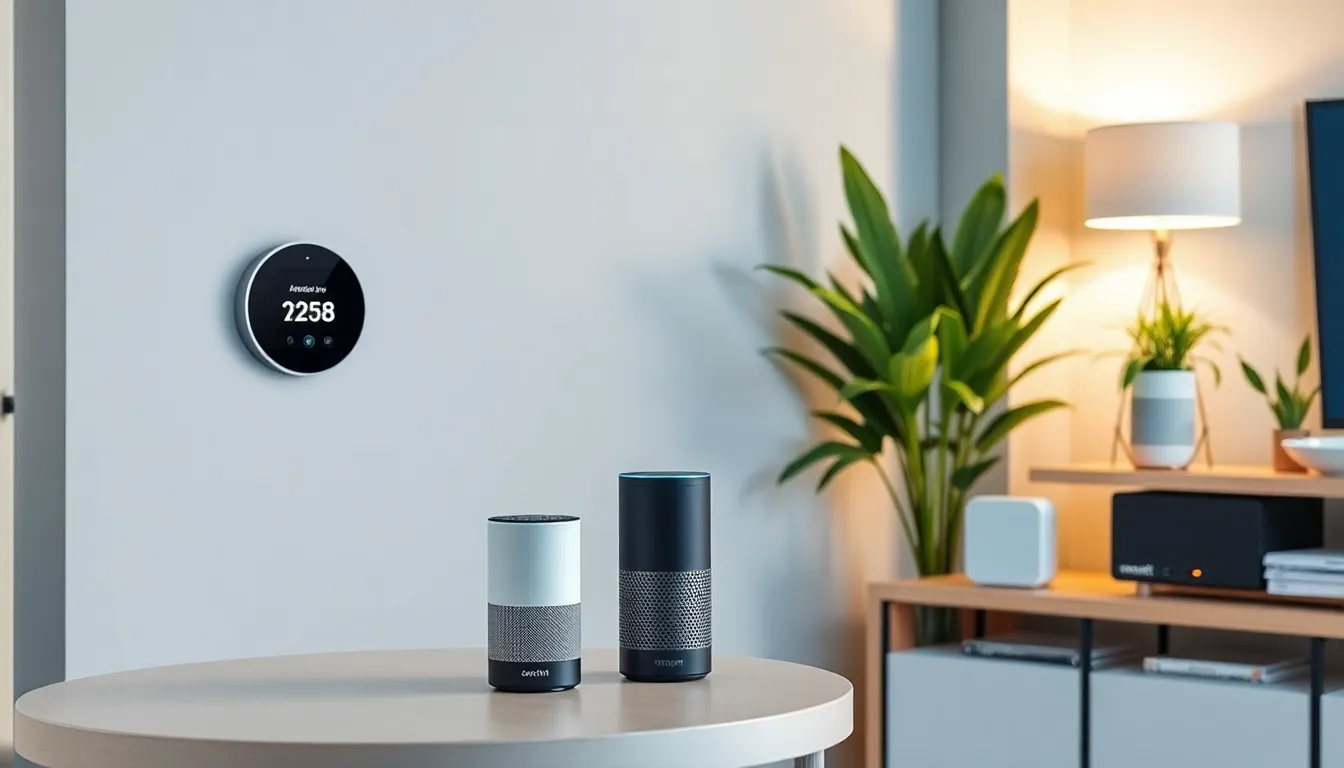Table of Contents
ToggleIn a world where smart fridges can order groceries and lights can dim with a simple voice command, home automation isn’t just a luxury—it’s the new norm. Imagine walking into a home that knows you better than your best friend, adjusting the temperature just right and playing your favorite tunes as you step through the door. Sounds like a dream, right? Well, it’s time to wake up and embrace the magic of technology!
Overview of Home Automation Companies
Home automation companies focus on integrating technology to improve everyday living. These solutions offer convenience, efficiency, and enhanced security for homeowners.
Definition of Home Automation
Home automation refers to the use of technology to control various household systems remotely. This includes lighting, heating, security, and entertainment. Systems often connect through the internet or a centralized hub. Individuals access these systems through smartphones or voice-controlled devices. Automation allows homeowners to schedule tasks, receive alerts, and monitor their homes from anywhere.
Benefits of Home Automation Solutions
Home automation solutions provide numerous advantages. These solutions enhance energy efficiency by optimizing heating and lighting usage. Homeowners experience increased security with smart surveillance cameras and alarms. Convenience plays a major role as residents can control devices remotely, even while away. Cost-effective solutions arise from reduced energy bills and potential insurance discounts. Other benefits include improved accessibility for individuals with mobility challenges.
Leading Home Automation Companies

Leading home automation companies specialize in integrating technology within homes, enhancing convenience and efficiency for homeowners. Here are key players in the industry.
Company 1: Overview and Features
Nest, a subsidiary of Google, focuses on smart home devices like thermostats and security cameras. This company integrates seamlessly with Google Assistant, allowing voice control for various functions. Nest thermostats learn user preferences, optimizing energy use and providing comfort. Home security features include alerts and live video feeds, enhancing safety through innovative technology.
Company 2: Overview and Features
Amazon offers a comprehensive range of smart home products under the Echo brand, powered by Alexa. Smart speakers serve as hubs for controlling compatible devices, including lights and thermostats. Voice commands simplify the management of daily tasks, providing convenience for users. Integration with third-party manufacturers expands the functionality of the home ecosystem, enhancing user experience.
Company 3: Overview and Features
Samsung’s SmartThings platform focuses on compatibility with a variety of smart devices. This open platform enables users to customize their home automation experiences. SmartThings allows coordination of lighting, security, and appliances through a single app. Advanced features include automation routines that adapt to the homeowner’s lifestyle, promoting energy efficiency and ease of use.
Comparison of Home Automation Technologies
Home automation technologies vary significantly, each offering unique benefits for homeowners. Understanding these differences helps individuals choose the right solution for their needs.
Smart Hubs and Controllers
Smart hubs act as the central point of communication for various devices. These hubs, like Samsung SmartThings or Amazon Echo Plus, enhance device compatibility. Users can control lights, thermostats, and locks from a single app, streamlining home management. Many smart hubs support voice commands for added convenience, allowing seamless integration with systems like Google Assistant and Alexa. Brands increasingly focus on user-friendly interfaces to appeal to a broader audience. Compatibility with numerous smart devices empowers homeowners to customize their setup, improving efficiency and enjoyment.
Security Systems Integration
Integrating security systems boosts home safety significantly. Leading automation companies provide surveillance options, including cameras and alarms that homeowners can access remotely. Systems like Ring or Arlo allow monitoring through smartphones, ensuring peace of mind while away. Automated alerts notify users of any suspicious activity, enhancing proactive security measures. Additionally, companies often offer smart locks that enable keyless entry, simplifying access control. Integration with other home automation systems fosters a cohesive security strategy, improving overall home protection.
Energy Management Solutions
Energy management solutions play a crucial role in optimizing power consumption. Smart thermostats, such as Nest or Ecobee, adjust heating and cooling based on occupancy, significantly reducing utility bills. Homeowners can track energy usage through various apps, identifying patterns and targeting inefficiencies. Automated lighting systems, paired with motion sensors, activate only when needed, conserving energy throughout the day. Many energy management products also incorporate renewable energy settings, enhancing sustainability. Companies prioritize user engagement by providing insights into usage, fostering informed decisions on energy consumption.
Customer Experience and Support
Customer experience and support play crucial roles in home automation companies. These companies prioritize user satisfaction, ensuring their products and services meet client expectations.
User Reviews and Testimonials
User reviews provide valuable insights into the effectiveness and reliability of home automation solutions. Customers often praise products for enhancing convenience, improving security, and providing energy savings. Many testimonials highlight successful installations and seamless app integrations with devices. Positive feedback frequently stems from user-friendly interfaces and responsive customer service teams. Instances of clients experiencing improved quality of life through automated systems also contribute to widespread positive opinions. Reviews help potential customers gauge company reputation before making purchasing decisions.
After-Sales Service and Support Options
After-sales service significantly impacts customer satisfaction in home automation. Support options typically include installation assistance, troubleshooting, and software updates. Many companies offer 24/7 customer support through various channels, including phone, email, and chat. Some provide comprehensive online resources such as FAQs and instructional videos to aid users. Timely responses from support teams enhance customer confidence in their purchases. Companies that prioritize after-sales service foster long-lasting relationships, improving overall user experience.
Home automation is reshaping the way people live by making everyday tasks easier and more efficient. As technology continues to evolve, homeowners are finding new ways to enhance their living spaces with smart solutions that prioritize convenience and security. The variety of companies in the market ensures that there’s a solution for every need and preference.
Embracing home automation not only improves daily routines but also contributes to energy savings and enhanced safety. With ongoing advancements and a focus on customer satisfaction, the future of home automation looks promising. Adopting these technologies can lead to a smarter, more connected home that truly caters to its occupants.


